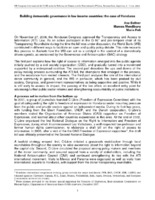Building democratic governance in low income countries: the case of Honduras

View/
Date
2008-11Author
Bellver Vázquez-Dodero, Ana
Mendiburu, Marcos
Poli, Maria
Metadata
Show full item recordAbstract
On November 27, 2006, the Honduran Congress approved the Transparency and Access to Information (ATI) Law. As an active participant in the G-161 and pro-tempore chair of its Transparency Roundtable during the time the bill was under discussion, the World Bank (WB) contributed in different ways to facilitate an open and quality policy debate. This note recounts this process to illustrate how the WB can act as a catalyst in the context of a domestically driven agenda, as envisioned by the Governance and Anticorruption (GAC) strategy. The Honduran case is specially relevant given that it is one of the few bottom-up process that have been successful in enacting Access to Information laws.As this case illustrates, the policy-making process is a dynamic process that involves multiple actors at different stages. The interaction and political negotiation between the actors during policy discussion, approval, and implementation shapes the outcomes at each stage of the process. More than a clear champion that sustained the momentum throughout the process, in the case of the ATI law in Honduras, there were different actors that emerged at particular points and were driven by different incentives. The bottom-up process was key in placing the issue at the top of the political agenda and shaping the incentives of politicians competing for popular support. Recognition from the international ATI movement and support from the international community were also instrumental in providing personal incentives for champions seeking to leave a legacy behind. The positive incentives offered by different donor instruments helped increase the rewards for reform vis-a-vis the political risk of confronting powerful vested interests. Strategic interventions at different moments in the process were also key to unblocking policy discussions, overcoming resistance from veto players, and generating a positive dynamic among actors. A major challenge, as in other countries, has been drafting the implementing regulations, a process that lasted for most of 2007 and was seen as the real test to assess government and IAIP's commitment to its implementation. By then, a new landscape had emerged. The worsening of corruption indicators, the publication of reports about the quality of poverty spending, and the cancellation of budget support operations by some donors, including the WB, put pressure on government to show some progress in the governance arena at the time when negotiations of external assistance programs were taking place. The president, facing the end of his term and without possibility of reelection, sees the law as one of his main accomplishments. Meanwhile, IAIP commissioners are growing in their role and civil society has redefined its new role around the effective implementation of the law, paving the ground for the emergence of an IAIP-CNA-civil society coalition. As a result of this new dynamic, ATI-implementing regulations, published on March 6, 2008, have been considered as in line with international standards, and progress regarding implementation also seems satisfactory.

